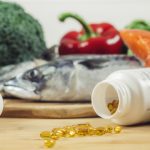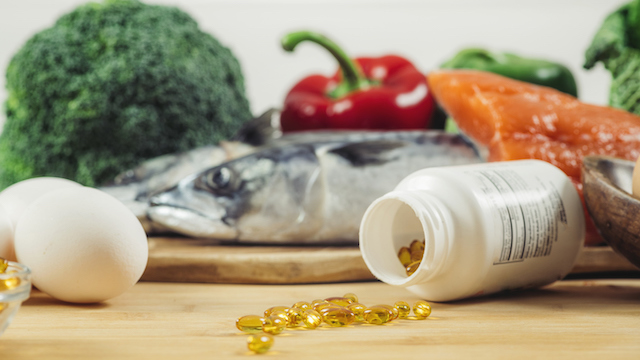Estimated reading time: 7 minutes
Are you looking for a natural way to manage your pain? It turns out that vitamin D is an essential supplement to help manage pain. In recent years there has been an increasing interest in using natural remedies for pain management. Vitamin D has emerged as a promising option. In this article, we’ll explore the benefits of vitamin D for pain relief, how it works, and how you can get enough of it.
Vitamin D facts and background
Vitamin D is a fat-soluble hormone-like vitamin that is made largely by your skin when it is exposed to the sun.
Roles of vitamin D
Vitamin D is not only important for you to have strong bones, but it’s important for a healthy and strong immune system. Vitamin D helps balance your immune system and control the amount of inflammation (swelling) in your body. It is likely through this role that raising your vitamin D levels through supplementation can help eliminate or reduce pain. (1)
Vitamin D deficiency
As I have said, you get most of your vitamin D by exposing yourself to the sun. However, getting enough vitamin D is a problem if you’re not going outside on a regular basis. Furthermore, if you live in the northern hemisphere you’re not going to get enough sun exposure during the Fall and Winter months. Ultimately, not getting enough sun exposure will lead to vitamin D deficiency. In fact, vitamin D deficiency is common in North America so you want to make sure you are getting enough vitamin D. (2, 3, 4)
Vitamin D deficiency is common in North America so you want to make sure you are getting enough vitamin D.
The link between vitamin D deficiency and pain
Research shows that low levels of vitamin D can contribute to chronic pain conditions such as fibromyalgia, osteoarthritis, and back pain. Studies have found a correlation between vitamin D deficiency and increased pain sensitivity. (5, 6, 7, 8, 9, 10, 11, 12, 13) This suggests that vitamin D may play a critical role in pain management. Therefore, ensuring adequate levels of vitamin D can help alleviate chronic pain.
Research shows that low levels of vitamin D can contribute to chronic pain conditions such as fibromyalgia, osteoarthritis, and back pain.
Research for vitamin D and pain relief
One of the main reasons why vitamin D is effective for pain relief is because of its ability to reduce inflammation. Inflammation is a natural response of the body’s immune system to injury or infection. However, when inflammation becomes chronic, it can lead to pain and other health problems.
Most of the good research since 2014 has shown that vitamin D supplementation can help reduce pain in a variety of conditions. (5, 6, 7, 8, 9, 10, 11, 12, 13) Fewer studies say otherwise. (14, 15, 16) In saying that, I would hedge my bets that making sure your vitamin D levels are at a good level would be important to control or eliminate pain.
Most of the good research since 2014 has shown that vitamin D supplementation can help reduce pain in a variety of conditions.
How to get enough vitamin D for pain relief
So how can you get enough vitamin D for pain relief and the other health benefits vitamin D offers? There are several sources of vitamin D, including sunlight, diet, and supplements. However, getting enough vitamin D through a mixture of sun, food, and supplements is probably going to work best for you.
Getting enough vitamin D through a mixture of sun, food, and supplements is probably going to work best for you.
Vitamin D from sunlight
As noted previously, vitamin D is best produced in your body when your skin is exposed to sunlight. This was not a problem for our recent ancestors of over 10,000 years ago as they were exposed to frequent and intense sunlight for most of the year. However, many modern humans work indoors, wear clothing that covers most of their body, and live far from the equator. All of this reduces our ability to convert sunlight into vitamin D within our bodies.
Stress, inflammation, obesity, and old age have also been shown to reduce our ability to convert sunlight into vitamin D. (17, 18, 19, 20)
Food Sources of Vitamin D
Most people will only get about 10% of their vitamin D daily needs from food. Here is a list of foods that contain vitamin D:
- cod livers or cod liver oil
- fatty fish salmon, herring, mackerel, marlin, sardines, rainbow trout, fatty tuna
- egg yolks (pasture raised have 4 to 6 times more vitamin D than conventional egg yolks)
Supplementing with vitamin D
As you can see, getting enough vitamin D from sunlight and food can be challenging. This is why you should consider supplementing with vitamin D.
Getting your vitamin D levels checked
It is best to get your vitamin D levels checked before supplementing with vitamin D. This helps to get your dosage correct and to avoid vitamin D toxicity. However, at present time, at least where I am from in Canada, it can be a challenge to get your vitamin D levels checked by your medical doctor. So you may have to go to a naturopath or a functional medicine practitioner to get this done.
If you can’t get your levels checked, I have often heard from naturopaths that dosing with 4000 I.U. per day for an adult is the ideal amount. If you can get your vitamin D levels checked, make sure you are getting your levels checked every 3 to 6 months to determine what your daily dose should be. A healthy vitamin D range, measured as 25-hydroxy vitamin D, is 75-150 nmol/L or 30-60 ng/mL. (21, 22, 23, 24, 25)
You may be producing plenty of vitamin D if you are outside a lot in the summer and your skin is exposed to the sun. In this case, you may need to stop supplementing with vitamin D in the summer.
Vitamin D toxicity
On the other hand, taking too much vitamin D can cause vitamin D toxicity. As well, what if you absorb vitamin D really well and the amount causes your levels to rise to a toxic level (125 to 150 nmol/l or 50-60 ng/mL or above)?
Toxic levels of vitamin D can cause the following (26):
- nausea
- vomiting
- diarrhea
- constipation
- heart attack
- stroke
- calcification of soft tissues
- kidney stones
- weight loss
- anorexia
- low bone density
Getting adequate vitamin A and vitamin K2 are necessary to protect against vitamin D toxicity. Vitamin A is found in liver, cod liver oil, pastured egg yolks, and orange and yellow vegetables. However, vitamin K2 is not easy to obtain from foods and I would recommend you supplement with about 200 mcg/day (MK7 form). Vitamin K2 can be found in poultry liver, pastured egg yolks, natto, and cheeses like gouda and brie.
If you’re considering taking vitamin D supplements for pain relief, it’s important to speak with your healthcare provider first. They can help you determine the appropriate dosage and monitor your health to ensure that you’re getting the right amount of vitamin D.
Vitamin D Supplements
Here is the vitamin D (vitamin D3) supplement I take:
This can be found in my dispensary, at my clinic, or at health food and supplement stores.
Conclusion
In conclusion, vitamin D is a promising natural remedy for managing pain. Its anti-inflammatory properties and other health benefits make it a safe and effective option for people looking to avoid prescription pain medication. By getting enough vitamin D through sunlight, diet, or supplements, you can improve your overall health while also reducing your pain. If you’re interested in trying vitamin D for pain relief, talk to your healthcare provider today.
To learn how you and your family can manage pain and your health naturally through chiropractic care click on Edmonton chiropractor Dr. Dean Collins’ complete guide to chiropractic care.



Leave a Reply